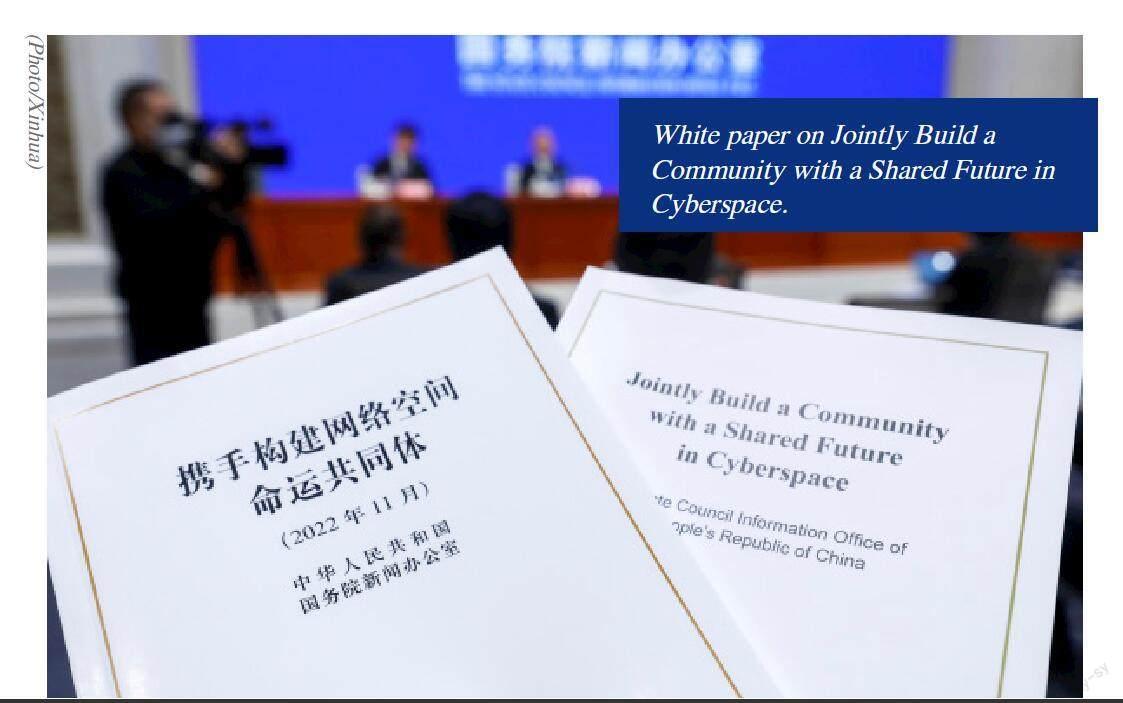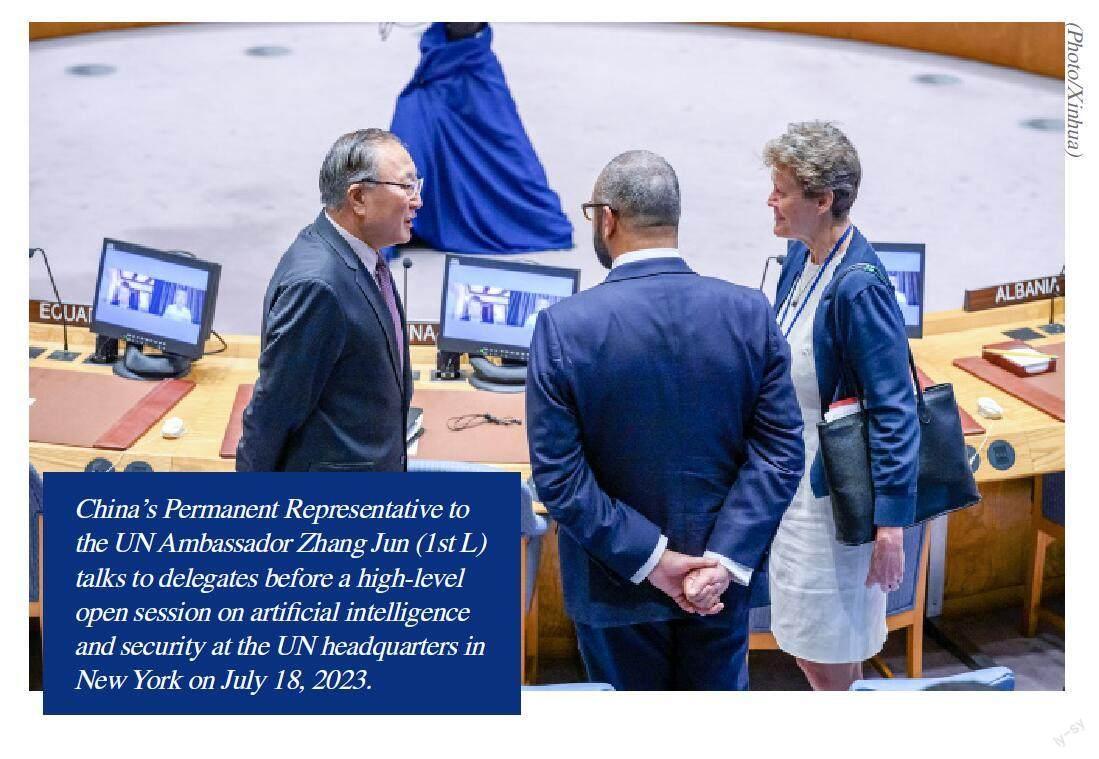National Security Dilemma in the Digital Era and the Building of a Community with a Shared Future in Cyberspace
Lang Ping



A review of the history of human development shows that every major technological revolution brings new challenges to national security. With the advent of the information technology revolution represented by the Internet, cybersecurity has become an issue of paramount importance, and the digital intelligence revolution with digital technology innovations such as big data and cloud computing has further expanded the connotation and extension of cybersecurity, which has been on a par with national security in the digital age. At present, the digital space has become an arena for competition between major countries. Against the highly uncertain security threats and risks in the digital age, joint governance or confrontation and split of the international community will determine, to a large extent, the future of human development.
National Security Environment in the Digital Age
With the acceleration of innovative applications and integrated development of digital technology, the digital, networked and intelligent revolution is unfolding around the world, and the digital economy has become a new driving force and engine for world economic growth and industrial transformation. Meanwhile, the widespread application of digital technologies also brings more and wider security risks, and national security faces greater uncertainty and complexity in the evolving technological development. This is manifested in the continuous ravages of malicious cyber activities such as cyberattacks and cybercrimes. Meanwhile, data security and artificial intelligence security risks are oncoming and intertwined with cybersecurity risks. National security environment in the digital era has changed from the Internet age to an era of digital intelligence .
In the Internet age, countries are facing two types of security threats which are technical and social. Security threats at the technical level exist in all aspects of the cyberspace system, and security threats at the social level are mainly cybercrime, cyberterrorism, infringement of personal information and privacy, public opinion warfare and information warfare in the context of information manipulation. The national security risks in the Internet era mainly come from the technical vulnerabilities of the Internet itself and the artificial use or weaponization of the application layer and content layer of cyberspace. In other words, the higher the degree of informatization of a country, the greater its dependence on network facilities, and the higher the security risks it faces. The United States, the creator of the Internet with the most powerful cyber strength in the world, has successively introduced offensive cybersecurity strategies such as “defend forward”, “persistent engagement”, “layered deterrence” and “hunt forward”, but also faces many cybersecurity threats.
In recent years, boosted by the wave of the Internet, important progress has been made in digital technologies such as big data, cloud computing, Internet of Things, and artificial intelligence. Digital economy and real economy have been deeply integrated with the cyberspace, thus ushering in the era of digital intelligence. An important feature of this era is the emergence of a convergence ecosystem of digital technology, and every technological innovation is backed up by other technological breakthroughs. Whether it is the prospect of the Internet of Everything or the wide application of artificial intelligence, it needs to rely on strong Internet infrastructure, and continuous improvement of big data technology and computing power. On the other side, security threats in cyberspace have also taken on new features of convergence. Whether it is the mutation and upgrading of cyberattack tools or the expansion of attack effects and scope of influence, supply chain security, data security, and artificial intelligence security not only are vital to a countrys industrial and economic security, but also penetrate into all aspects of the countrys political, economic, social, and military fields, with wide-ranging implications.
In particular, the major breakthroughs in strong artificial intelligence have attracted great attention for the security risks they brought about. Ian Bremmer, political scientist and president of the Eurasia Group, a consulting firm that studies global political risks in the United States, pointed out that the iterative upgrade rate of generative AI is beyond imagination. Countries try to control AI and make it available for their own use, but it is far from keeping up with the upgrade and popularization of AI. This technology is likely to threaten the status of the nation states as a force to shape of geopolitical order in the world and will trigger a fundamental shift in the global power structure and balance.
State Actors in the Digital Security Dilemma
The security risks accumulated during the continuous evolution of the digital age have become an important feature of the changes of the current era, and the profound adjustment of the balance of power between major countries has led to the intensification of major country competition, which has become not only the root cause of the national security dilemma in the digital age, but also an important fulcrum for the evolution of international relations in the digital age. Security has always been the most fundamental interest of state actors in a state of anarchy, and the protection of a country from major security threats and the elimination of security fears are the most fundamental needs for their participation in international interactions. Changes in the international environment in the digital age are having an impact on the behavior of states in the international system.
First, growing sense of insecurity in a country. It is generally believed that security refers to the state in which a country feels free from threats or fear, including both the objective situation of external threats and the subjective perception of threats by actors, which is directly related to its ability to maintain national security. At a time when the balance of power of states has undergone profound adjustments, the rapid iteration of digital technology innovation and application has become an important engine for the improvement of the comprehensive national strength of major countries, but it will also lead countries to fall into a vacuum of security capabilities in this field, with increased national insecurity, and intensified the fear of the rapid improvement of the strength of other countries, especially adversary countries. For example, in June 2023, Germany released its first National Security Strategy, covering diplomacy, police affairs, international development, cybersecurity, and supply chain, marking a significant pan-security shift in Germanys national security concept in the digital age.
Second, generalization and abuse of the concept of national security in the context of major country competition. As geopolitical conflicts and major country rivalry intensify, some countries have begun to use the power given by economic interdependence as a geopolitical tool for forcing other countries. In particular, in the context of the development of digital technology towards an integrated ecosystem, the scientific and technological cooperation, investment and trade exchanges and even related people-to-people exchanges in the digital field are artificially related to national security and containment measures are expanded systematically from certain technology companies to the entire industrial chain, and the exchange activities between countries in many fields such as economy and society are under the control of the so-called national security. It not only leads to the fragmentation of the global industrial chain and supply chain, greatly reducing the production efficiency of the global economy, but also drives up the cost of maintaining security for relevant countries and increases the risk of falling into a security dilemma.
Third, consideration of balancing security and development in foreign relations. As countries sense of insecurity in the digital age is on the rise, and the concept of security continues to generalize, more and more foreign economic activities are restricted as they are considered to be closely related to national security. Considering the universality and dual-use of digital intelligent technology in both military and civil applications, for a country, whether to adopt an open or restricted strategy in the digital field concerns not only the market interests of its relevant industries and national economic development, but also whether its national security risks are controllable. There are typical cases related to supply chain security and cross-border data flow. In recent years, whether it is Europe and the United States that have shifted from the initial “decoupling theory” to the so-called “de-risking” with China, or the United States that hopes to narrow down the scope as much as possible, draw a line and focus on the real neck technology against China in the process of promoting the “small courtyard with high walls” strategy, the essence is seeking to maximize their own development interests while developing economic and trade relations with China, and safeguard their core security interests on the basis of maintaining their absolute competitive advantage over China.
Work Together to Build a Community with a Shared Future in Cyberspace
In the face of more complex and uncertain factors and challenges in the era of digital intelligence, whether the international community should allow geopolitical confrontation and competition to escalate or work together to deal with it is a major issue facing all countries, especially major countries. If the former is chosen, human society will probably enter an era of uncontrollability, and the development of science and technology will bring about large-scale conflicts, confrontations, and regression of civilizations. If the latter is chosen, the international community will jointly address the security threats and challenges brought about by digital technology on the basis of shared governance, and bring peace, prosperity and civilization progress to the world.
As far as the current international system of cyberspace is concerned, the models of cooperation between countries can be broadly divided into three categories: dependent cooperation, major country competition, and full cooperation. The dependent cooperation model is characterized by unequal cooperation between the dominant country and the dependent country, and the former can use the resources of the latter to a large extent to develop the digital economy and provide security protection for the latter, but it is easy to fall into a “center-periphery” digital hegemony system, which will solidify and exacerbate the inequality in the development of the global digital economy. The major country competition model, often occurs between the advanced countries and the rising countries. Their competition in the digital space across the board, can easily fall into traps of security race that divert a lot of resources for economic development. The full cooperation model is characterized by shared governance, mutual benefit and win-win results, which is more conducive to the common development of all parties on the basis of balanced security.
Theoretically, Chinas initiative to jointly build a community with a shared future in cyberspace is consistent with the full cooperation model which is conducive to achieving a dynamic balance between high-quality development of the digital economy and high-level security across the world by coordinating the interests of all countries and promoting cooperation among all parties. In practice, in the face of the rather anarchic in the international community, especially in the national security environment where uncontrollable risks continue to increase in the digital age, how should we promote the building of a community with a shared future in cyberspace?
First, the international community should fully recognize that common security is the only effective way to address the digital security dilemma. Looking back at the development of the Internet, while the Internet is innovating human production and lifestyle, the security risks it faces continue to expand, and deficits in security and governance in cyberspace continue to increase due to the lack of effective cooperation between countries. Driven by a strong sense of insecurity, some countries pursue self-security by increasing their own security investment and adopting aggressive unilateral security measures, which only leads to greater insecurity due to the characteristics of cyberspace security risks of crossing national borders and converging in multiple domains. The advent of the era of digital and artificial intelligence is like a potentially powerful risk amplifier, which is likely to bring immeasurable security risks to mankind in the case of disorder in cyberspace. If the development of science and technology does not necessarily bring about the progress of human civilization, and human history has always been in a cycle between progress and retrogression, the primary condition for getting rid of retrogression and turning to the path of progress is that all countries should establish the concept of common security.
Second, justness and equitableness are the basic requirements for the establishment of an international order in cyberspace. Justness is mainly manifested in respect for the cyber sovereignty of all countries. The principle of sovereign equality is the fundamental norm governing contemporary international relations in cyberspace, and it is also the premise and foundation for building a community with a shared future in cyberspace. Since the essence of international cooperation is the transfer of sovereignty, the international order in cyberspace can only be built on the basis of voluntary obedience by countries, otherwise it cannot reflect the sovereign equality between countries. Equitableness is mainly manifested in the balance of rights and responsibilities of countries, and the balance and reciprocity of rights and responsibilities is a recognized principle of international law, which is particularly important for the construction of the current international order in cyberspace. Since cyberspace is a technology-based man-made space, and some countries have seized enormous power by virtue of the absolute superiority of the first mover, they should assume greater international obligations at a time when the technological ecosystem is becoming increasingly integrated and the digital divide continues to widen. From the Internet era to the era of digital and artificial intelligence, countries have built fences of sovereign borders in cyberspace to safeguard national security. As the Western proverb goes, “Good fences make good neighbors”, sovereign boundaries are like fences in cyberspace, but only a just and equitable distribution of rights and responsibilities can be called good fences and ensure that the construction of a community with a shared future in cyberspace is continuously promoted.
Third, the effectiveness of actions is an important consideration in promoting the implementation of the construction of a community with a shared future in cyberspace. The greatest truths are the simplest, and hard work is the key. Based on the concept of common security and the principle of justness and equitableness, the key to building a community with a shared future in cyberspace lies in promoting effective collective action. To date, the negotiations on the United Nations Convention Against Cybercrime have been the most fruitful collaboration of the international community in the field of cybersecurity. By contrast, countries have been unable to reach agreements on many issues such as cyber warfare, norms of responsible behavior in cyberspace, and the application of international law, partly due to differences in their strategic perceptions of cyberspace security. In addition, the severity of cyberspace security threats is not enough for countries to put aside their differences of interest and jointly deal with them. The advent of the era of strong artificial intelligence may become an important turning point in the history of cyberspace security. In the face of the risk of uncontrolled security and even the extinction of mankind brought about by artificial intelligence, the international community should work together to take effective and collective actions to implement the concept of a community with a shared future in cyberspace.
Lang Ping is Researcher at the Institute of World Economics and Politics of the Chinese Academy of Social Sciences
- 当代世界英文版的其它文章
- Historic Achievements of Institutional Construction of Intraparty Rules and Regulations of the Communist Party of China in the New Era
- Global Economic and Trade Landscape Reshaping and High-Quality Belt and Road Cooperation
- The New Situation of Africa’s Autonomous Development: Causes and Prospects
- The European Political Community: Establishment, Motivation and Prospect
- China’s Development in the New Era to Make Greater Contributions to the World
- Towards a Community with a Shared Future for Mankind: Theoretical Basis and Practical Logic of Jointly Advancing the Belt and Road Initiative

